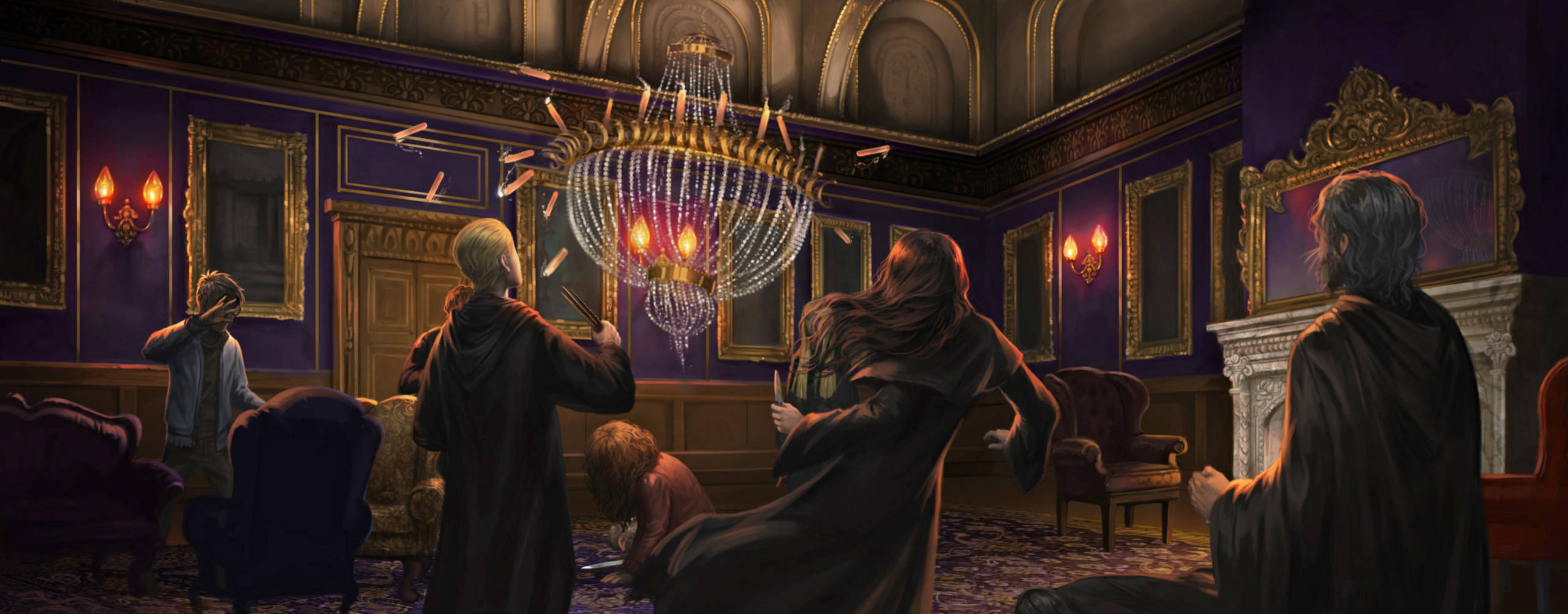Their wily ancestor Armand encapsulated many of the qualities that have distinguished the Malfoy family to the present day. The Malfoys have always had the reputation, hinted at by their not altogether complimentary surname, of being a slippery bunch, to be found courting power and riches wherever they might be found. In spite of their espousal of pure-blood values and their undoubtedly genuine belief in wizards’ superiority over Muggles, the Malfoys have never been above ingratiating themselves with the non-magical community when it suits them. The result is that they are one of the richest wizarding families in Britain, and it has been rumoured for many years (though never proven) that over the centuries the family has dabbled successfully in Muggle currency and assets. Over hundreds of years, they have managed to add to their lands in Wiltshire by annexing those of neighbouring Muggles, and the favour they curried with royalty added Muggle treasures and works of art to an ever-expanding collection.
Historically, the Malfoys drew a sharp distinction between poor Muggles and those with wealth and authority. Until the imposition of the Statute of Secrecy in 1692, the Malfoy family was active within high-born Muggle circles, and it is said that their fervent opposition to the imposition of the Statute was due, in part, to the fact that they would have to withdraw from this enjoyable sphere of social life. Though hotly denied by subsequent generations, there is ample evidence to suggest that the first Lucius Malfoy was an unsuccessful aspirant to the hand of Elizabeth I, and some wizarding historians allege that the Queen’s subsequent opposition to marriage was due to a jinx placed upon her by the thwarted Malfoy.
With that healthy degree of self-preservation that has characterised most of their actions over the centuries, once the Statute of Secrecy had passed into law the Malfoys ceased fraternising with Muggles, however well-born, and accepted that further opposition and protests could only distance them from the new heart of power: the newly created Ministry of Magic. They performed an abrupt volte-face, and became as vocally supportive of the Statute as any of those who had championed it from the beginning, hastening to deny that they had ever been on speaking (or marrying) terms with Muggles.
The substantial wealth at their disposal ensured them considerable (and much resented) influence at the Ministry for generations to come, though no Malfoy has ever aspired to the role of Minister for Magic. It is often said of the Malfoy family that you will never find one at the scene of the crime, though their fingerprints might be all over the guilty wand. Independently wealthy, with no need to work for a living, they have generally preferred the role of power behind the throne, happy for others to do the donkey work and to take the responsibility for failure. They have helped finance many of their preferred candidates’ election campaigns, which have (it is alleged) included paying for dirty work such as hexing the opposition.
The Malfoys’ unfeigned contempt for all Muggles who could not offer them jewels or influence, and for the majority of their fellow wizards, drew them naturally towards the pure-blood doctrine, which seemed for several years in the twentieth century to be their likeliest source of untrammelled power. From the imposition of the Statute of Secrecy onwards, no Malfoy has married a Muggle or Muggle-born. The family has, however, eschewed the somewhat dangerous practice of inter-marrying within such a small pool of pure-bloods that they become enfeebled or unstable, unlike a small minority of fanatic families such as the Gaunts and Lestranges, and many a half-blood appears on the Malfoy family tree.
Notable Malfoys of past generations include the fourteenth-century Nicholas Malfoy, who is believed to have dispatched many a fractious Muggle tenant under the guise of the Black Death, though escaping censure by the Wizards’ Council; Septimus Malfoy, who was greatly influential at the Ministry in the late eighteenth century, many claiming that Minister for Magic Unctuous Osbert was little more than his puppet; and Abraxas Malfoy, who was widely believed to be part of the shady plot that saw the first Muggle-born Minister (Nobby Leach) leave his post prematurely in 1968 (nothing was ever proven against Malfoy).
Abraxas’s son, Lucius, achieved notoriety as one of Lord Voldemort’s Death Eaters, though he successfully evaded prison after both of Lord Voldemort’s attempted coups. On the first occasion, he claimed to have been acting under the Imperius Curse (though many claimed he called in favours from high-placed Ministry officials); on the second occasion, he provided evidence against fellow Death Eaters and helped ensure the capture of many of Lord Voldemort’s followers who had fled into hiding.







